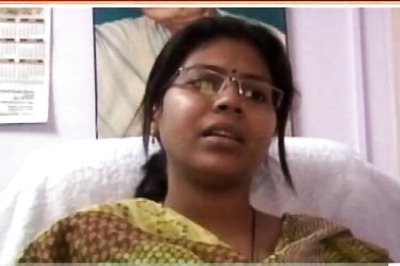
views
New Delhi: Even as Prime Minister Narendra Modi put out his views in favour of the ‘One Nation, One Poll’ agenda during the all-party meeting in New Delhi on Wednesday, the Bharatiya Janata Party (BJP) is facing the grand old party’s opposition to separate byelections for the Rajya Sabha.
Following the election of BJP leaders Amit Shah and Smriti Irani to the Lok Sabha, the Election Commission has set July 5 for election to the two Rajya Sabha seats that fell vacant from Gujarat.
The BJP, which is pushing the agenda of holding Lok Sabha and assembly polls simultaneously, is facing stiff opposition against separate bypolls for the two seats in the Rajya Sabha.
Soon after the poll body issued its notification on June 15, the Gujarat Congress filed a petition in the Supreme Court against the EC’s decision for separate byelections. The Supreme Court heard the petition on Wednesday and sought a response from the EC by June 24. Amid the unfolding of India’s latest political crisis, News18 explains the significance of the move.
The Problem
Congress MLA from Amreli and leader of opposition in Gujarat Assembly, Pareshbhai Dhanani filed the petition citing the poll panel’s order as “unconstitutional, arbitrary, illegal, void ab initio”. He said the decision violated the basic principle of Article 14 of the Constitution – equality before law.
Dhanani, in his petition, has argued that two separate elections would disrupt the scheme of proportional representation as mandated under the Representation of Peoples Act. The Act states that regular vacancies existing during elections must be held together so that proportional representation can be maintained by means of single transferable vote.
Hence, the EC’s decision to hold separate elections, the petition notes, may result in abuse of power by allowing the majority party to plan the byelection in a manner that yields them maximum benefit.
What this means is that if the EC successfully holds separate bypolls, the BJP, in all probability, has a higher chance to get its leaders elected from the two vacant seats. Gujarat sends 11 MPs to the Rajya Sabha, of which four currently belong to the Congress, five to the BJP, while two are vacant.
The Change
Moving past the older preferential ballot system, the byelections to the Rajya Sabha, this time, will be held via a separate ballot paper system. Under the preferential ballot system, an MLA marks his preferred candidate on the ballot paper that carries the contenders’ names by assigning him/her a grade of 1,2,3,4 and so on.
This system carries the advantage of the single transferable vote (STV) system wherein an MLA’s vote is counted only once but is transferable to the next preferred candidate. However, under the new system, the two byelections will be treated as two separate elections. There will be separate ballot boxes and ballot papers. Here, the issue of marking a preference will not arise.
This change will increase chances of a BJP candidate winning the bypoll because of the makeup of the Gujarat Assembly. The assembly has 182 MLAs of which 100 belong to the saffron party, while 77 are from the Congress.
If all of the ruling party’s MLAs vote for their candidate, the BJP will retain the vacant seats. However, under the preferential ballot system a party’s candidate would have required votes from at least 61 MLAs to win, giving the Congress a fair chance to compete on both seats.
The Solution?
Following the Supreme Court petition, the BJP slammed the Congress and called it a “lie spreading machine” for opposing the EC’s decision. "The Congress is misleading the people. By-polls for the Rajya Sabha always take place separately," a BJP leader said last week.
Congress spokesperson Abhishek Manu Singhvi told reporters that if the byelection was held separately, the BJP would win both the seats in the “first-past-the-post” system. He said the Congress had a likely chance to win one of the two seats if voting was held simultaneously on the same day.
The Election Commission in its June 15 press note had said that “the vacancies for by-elections to all Houses, including the Rajya Sabha, are considered as separate vacancies and separate notifications are issued and separate poll is taken for each of the vacancies although the programme schedule for the bye-elections may be common”.
The poll body maintains that the decision to hold separate elections has been a consistent practice under provisions of Section 147 to 151 of the Representation of the People Act, 1951, and two Delhi High Court mandates in 1994.
However, the Congress has alleged that the poll panel had “arbitrarily, malafidely, maliciously and under the diktat of the incumbent government” issued the June 15 press note. The Congress’ argument is that while the EC acknowledged that separate notifications must be released for separate vacancies, it issued the June 15 press note for byelection of six seats across three states.
On May 28, former BJP president Amit Shah's Rajya Sabha seat was declared vacant after he won his first general election from Gandhinagar. Similarly, Irani's seat was notified as vacant a day later. She defeated Congress president Rahul Gandhi in Amethi, Uttar Pradesh. The Supreme Court is set to hear the case again on June 25.


















Comments
0 comment